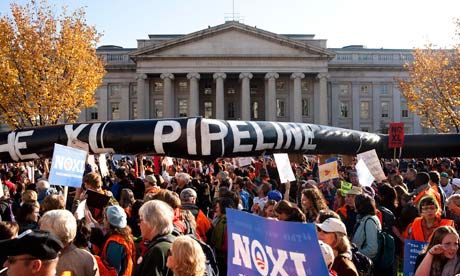News
You are here
Historic protest demands end of Keystone pipeline

February 21, 2013
It was surely no accident that, while as many as 50,000 protesters converged in Washington to demand an end to the Keystone XL pipeline, Barak Obama chose to play golf with Tiger Woods.
The match took place in a high security, gated Florida resort. Rounding out the foursome were US trade representative Ron Kirk and owner of the resort, Houston businessman Jim Crane. Crane is an oil-baron; his fortune flows from oil and gas corporations Western Gas Holdings and Anadarko Petroleum Corporation. Kirk, former mayor of Dallas, has led the US negotiations for the Trans-Pacific Partnership to open “free trade” with China.
In spite of Obama’s cozy relationship with the oily 1 %, the KXL is in big trouble. Designed to bring synthetic crude from Alberta’s Tar Sands to Texas refineries, the pipeline has been a lightening rod for protest from First Nations in both Canada and the US, environmentalists and anyone concerned about global warming. Even western ranchers–not known for their radicalism–are organizing to stop it.
The pipeline route, despite tinkering, crosses some of the most environmentally sensitive areas of the US plains, and must go through First Nation reserves. In January, hundreds of indigenous people joined ranchers and environmentalists at the state capital in Lincoln, Nebraska to say the pipeline will not go through.
Many of them made the trek to Washington, D.C. for February 17. It was the largest single climate change protest in US history, proving that even his supporters have grown tired of Obama dragging his heels on global warming. Dozens were arrested, including the executive director and the president of the Sierra Club. Significantly, it was the first time in the Sierra Club’s 120-year history that it officially took part in civil disobedience.
The Tar Sands are Fracked
The political pressure on Obama to kill the Keystone XL plan is growing, and that is excellent. But the purported abundance of cheap natural gas and shale oil, extracted through fracking, could be the final nail in the Keystone’s coffin.
Extracting gas and oil by injecting a high-pressure mixture of water and chemicals into shale bedrock is a bonanza for oil and gas companies, but a disaster for people living in the area. Water tables are contaminated, farmland is destroyed and bedrock is destabilized resulting in earthquakes.
Opposition to fracking is growing around the world. At the same time as pipeline protesters gathered in Washington, a New York State anti-fracking campaign forced the governor to delay, if not end, plans to begin gas drilling.
Exploiting Tar Sands and shale beds are desperate, last-ditch attempts to wring profits out of fossil fuels. Extraction is expensive, locally dangerous and extremely destructive to the planet. Mobilizing to stop pipelines and fracking go hand in hand. The time to transition to clean, renewable energy is here, and to delay further is criminal.
Section:










